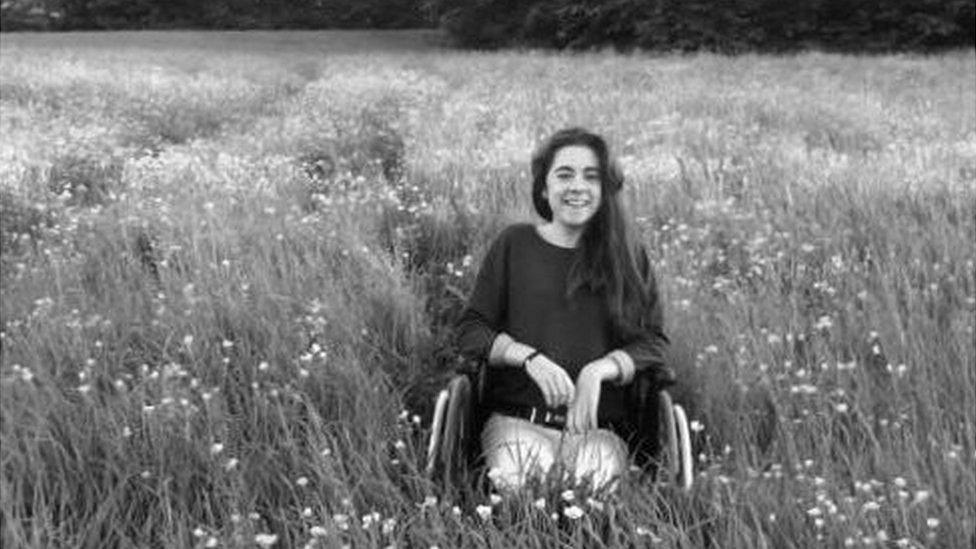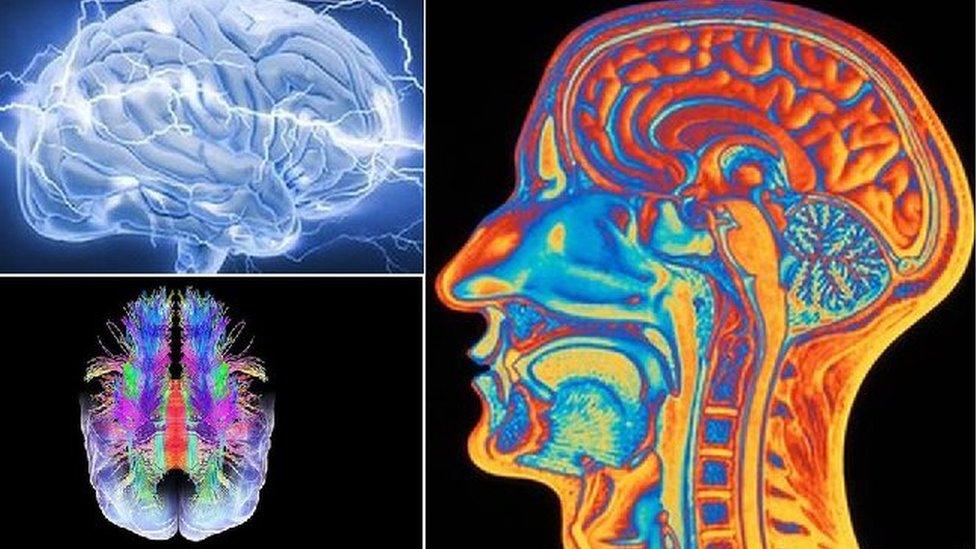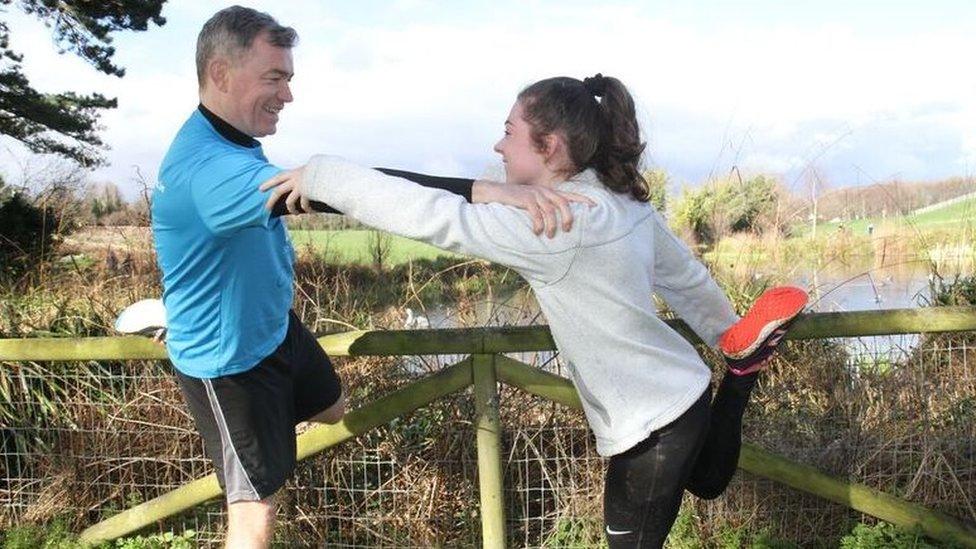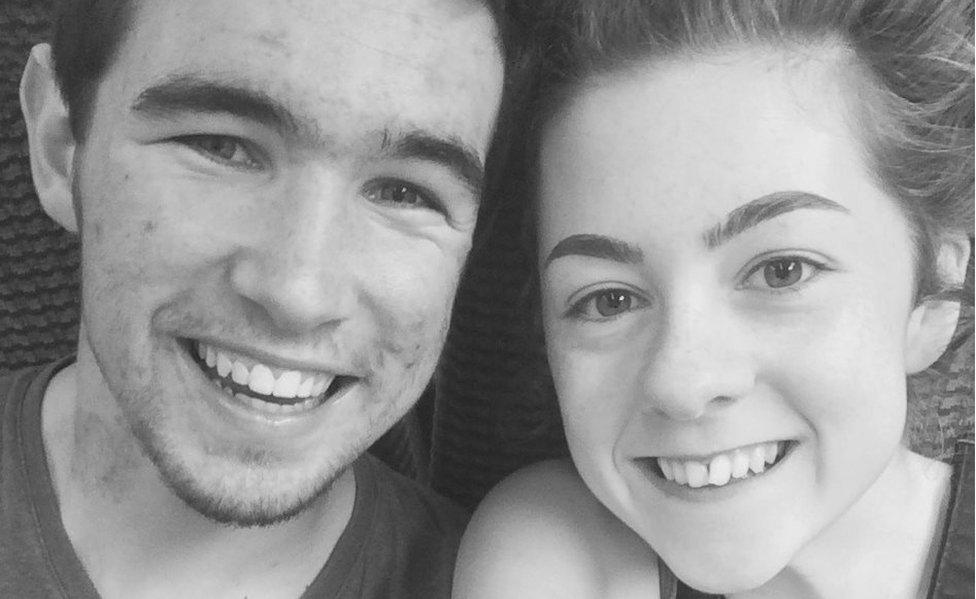The teenager who loses consciousness when she runs (original) (raw)
Media caption,
The 19 year old who runs away from ambulances
Among the pack of runners one moment, collapsed on the ground and frothing at the mouth the next. For a short time she is lost to the convulsion and then she scrambles to her feet and sprints away. Katie Cooke will not let epilepsy get in the way of a race.
The 19-year-old student from Cherrywood, South Dublin, has what her specialist doctor calls the "Arsenal of epilepsy" and contends with up to 15 convulsions a day which render her unconscious.
"Your whole body is shaking, you can feel your muscles jumping, it feels like everything has been sucked out of you, you can't breathe," she says.
"Every single day you lose control."
Despite having to cope with multiple seizures when she runs, Cooke has won prestigious events including her age group in the Dublin City Marathon and she runs 5km in under 17 minutes. She can often be seen pounding the streets with her running partner, Dr Colin Doherty, who also happens to be her consultant neurologist.
But she wasn't always so athletic.
 Image source, Katie Cooke
Image source, Katie Cooke
Diagnosed at the age of nine with frontal lobe epilepsy, she managed her condition with medication until it deteriorated when puberty hit and her hormones started "kicking up".
"I wasn't able to get out of bed. I wasn't able to do anything for myself and couldn't really speak. My Mum was dressing me and showering me," she says.
Cooke was admitted to Our Lady's Children's Hospital in Crumlin where she remained for 10 months. Despite being involved in numerous medical trials she regressed, lost control of her back and hips, and by the time she was discharged she wasn't able to walk.
"I couldn't hold myself up and was in a wheelchair for about seven months but being a very stubborn person I wanted to prove to people what I could do.
"After a lot of physio I started jogging every day and I started to absolutely love the freedom."
 Image source, Katie Cooke
Image source, Katie Cooke
Cooke now runs every day and says a missed session sees the tiredness and dizziness of her earlier condition return.
But running only alleviates her symptoms, it hasn't been a cure.
The raised heart rate brought on by running triggers more seizures than if she didn't run, but Cooke says it improves her general well-being which is a negative worth accepting.
Her neurologist, Dr Doherty, has also weighed up the pros and cons from a medical perspective.
"There are particular challenges with having epilepsy and long-distance running, but if you're walking you have those challenges too and I think the general benefits outweigh these risks," he says.
"If you took the average long-distance runner and measured all their health parameters against somebody who doesn't run you would find, no matter what disease or disorder they carried with them, they're better off."
If you have a health condition and are thinking about starting to exercise it is always important to consult your doctor first.

Dr Colin Doherty explains epilepsy
 Image source, SPL
Image source, SPL
The brain consists of about three billion cells and all of these cells are active, but they don't fire together - the brain is a de-synchronised machine. The signature of epilepsy is that the cells fire together in a synchronised way. If a million cells fire together that causes a change in behaviour but when all three billion cells fire together you've got a convulsion or a fit.
There are about 40 distinct types of epilepsy. In some cases people will just stare blankly, others will wander around in a confused state and there are those who fall to the ground with convulsions.

Competitive running was initially a non-starter for Cooke. As soon as she had a convulsion during a race paramedics would withdraw her from the event, but a chance comment at one of her consultations led Doherty to offer himself up as her running partner and he has kept her on track ever since.
He says: "I'm a specialist in epilepsy but my sole role when running with Katie is to stop people from taking her off in an ambulance. I just stand there and say 'Katie's fine, I'm her doctor, she's going to recover'."
Despite Cooke having so many seizures, the nature of her epilepsy means her body doesn't require any recovery time and she is able to immediately get up and run again.
Doherty suspects it is her fitness levels which help with that recovery.

Hear more from Katie and Colin

Listen to the BBC Ouch talk-show to find out more about Katie Cooke, Dr Colin Doherty and their running partnership.

"Katie is a very serious runner, she trains properly. I'm very confident that this is a really positive experience for her," he says.
As well as sport and college, Cooke also has to navigate a social life and a relationship with boyfriend Jack, a role most daunting at night when Cooke's seizure's make her scream, thrash around and cause the bed to shake and shudder.
Cooke says: "He's one of the most chilled people I know and he sleeps through my seizures which is a bit weird. He wakes up for the odd one because some are quite violent, and I've slapped him in the face before, but he just falls asleep again."
In terms of intimacy Cooke says sex doesn't trigger seizures, although a fit can occur at such times, and women often report an increase in convulsions around the time of ovulation and their period.
 Image source, Katie Cooke
Image source, Katie Cooke
Her night-time seizures can also be accompanied by hallucinations of a shadowy man who she says "comes for me" and it is these which leave her most exhausted.
"I don't sleep at all," she says. Her education suffered and she missed the majority of secondary school.
Despite that, she managed to cram three years worth of curriculum for the Irish Leaving Certificate into one year and secured a place at college to study sports management.
Doherty calls her a "remarkable young woman" for all she has achieved while handling so many severe convulsions on a daily basis.
While for most people, watching Katie drop to the floor mid-run would be alarming Doherty believes being so public about it will help others with the condition.
"We need to facilitate people to live as normal life as possible and they need to be encouraged to do everything," he says. "The biggest barrier is not the safety issue but the perceptions of other people."
For more Disability News, follow on Twitter, external and Facebook, external, and subscribe to the weekly podcast.